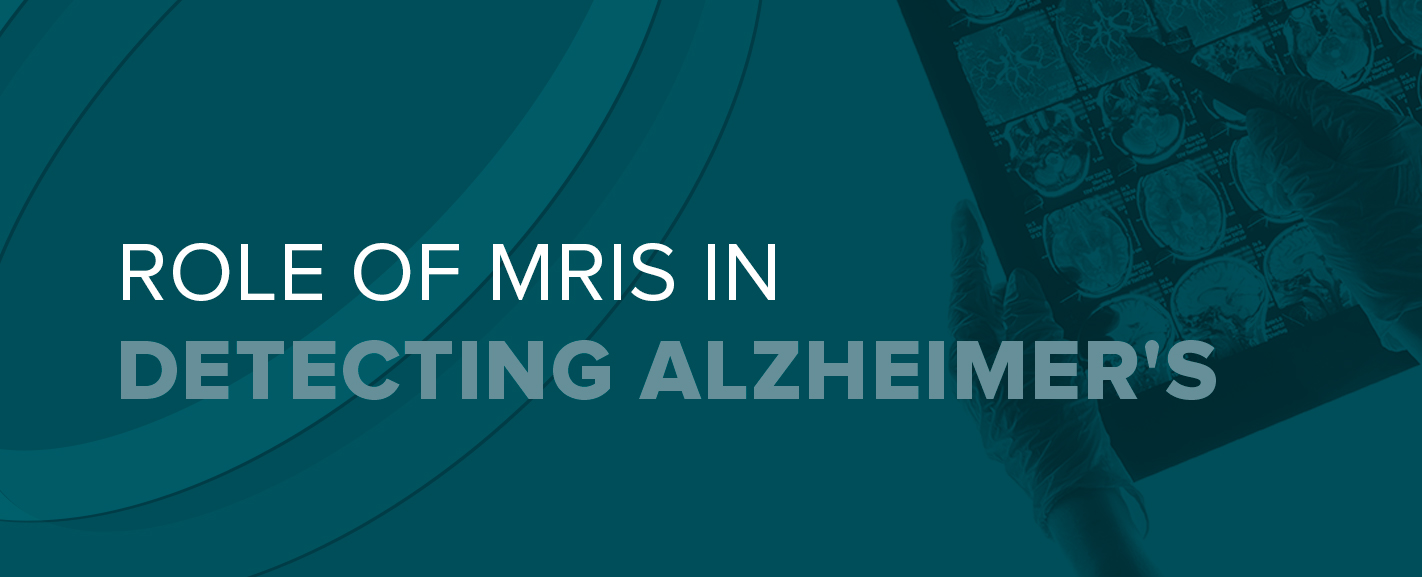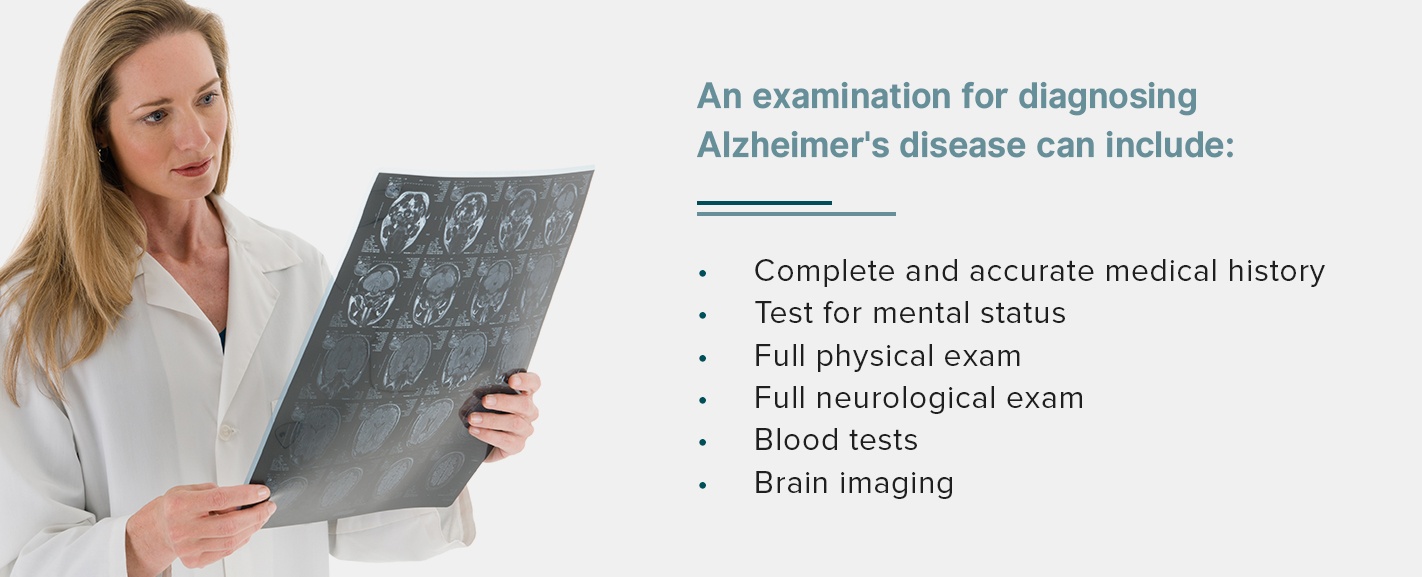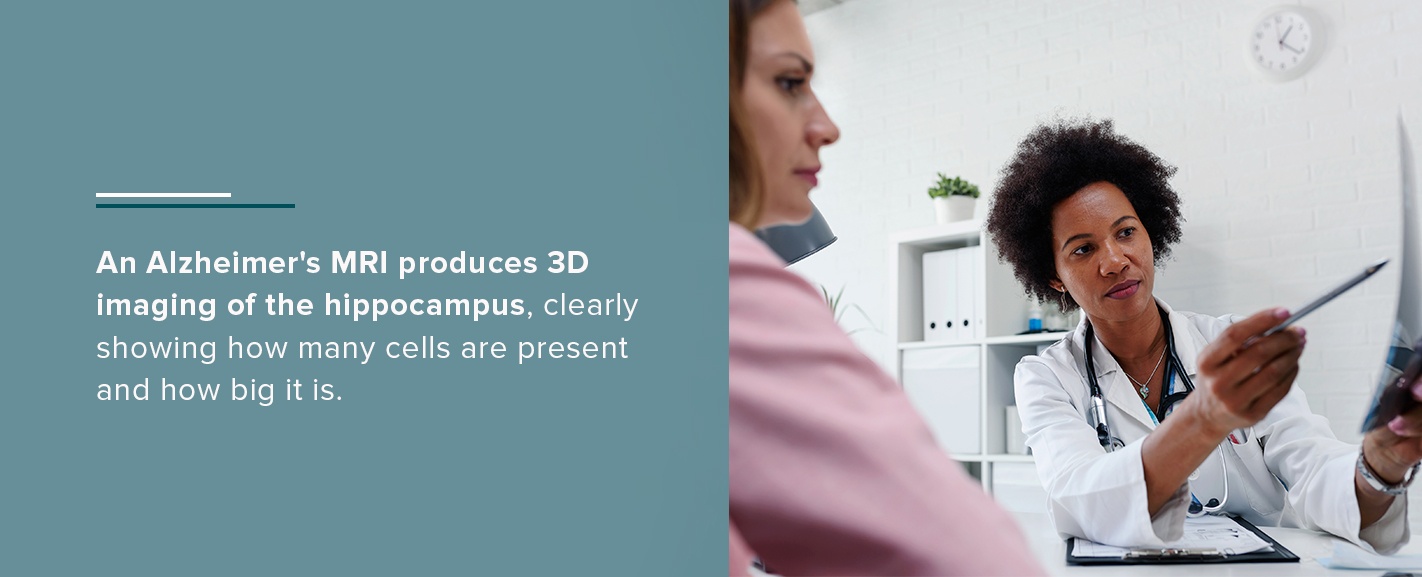Role of MRIs in Detecting Alzheimer’s

Alzheimer’s is a neurological disease affecting the neurons of the brain. It is an irreversible condition that progresses quickly, and no testing can definitively diagnose it. However, as we learn more about this detrimental condition, we can better understand how to detect it.
MRIs are one of these methods, allowing us to see how the brain is functioning and help slow the progression of the disease.
What Is Alzheimer’s Disease?
Alzheimer’s is thought to be the result of beta-amyloid plaques, which are thick protein deposits present in the brain, and neurofibrillary tangles — abnormal structures, which form in neurons — building up in the brain. This buildup causes neurons in the brain to cease working, losing connection with other neurons before dying. However, the exact cause of Alzheimer’s is still unknown. The condition is the most common form of dementia and can quickly progress from being mild to severe.
There are no known causes for Alzheimer’s since the disease is still being studied. A person’s chances of developing Alzheimer’s tend to increase with age, but people in their 40s and 50s can begin showing symptoms of early-onset Alzheimer’s. People who have a relative with the condition may also be at higher risk of developing it themselves since the disease has hereditary factors.
A person’s overall physical health may also be a factor in whether they develop Alzheimer’s disease. One study showed that people who have heart disease or other cardiovascular issues could be at a higher risk of developing Alzheimer’s than those with good heart health. This is because cardiovascular issues often reduce the amount of blood the brain receives, which may increase the cognitive issues associated with Alzheimer’s.
Unfortunately, there’s no cure for Alzheimer’s yet, but medications can help decrease the speed with which it progresses. Forgetfulness and memory loss caused by aging can sometimes extend and develop into Alzheimer’s when they begin interfering with everyday activities.
The very early stages of the condition make it difficult for the patient to perform simple tasks that require thought, lose social skills and have problems speaking. Changes in sleep patterns, violent behavior and agitation become more apparent as the disease progresses, and people with severe cases cannot recognize even their closest friends and family.
How Is Alzheimer’s Disease Diagnosed?
So little is known about Alzheimer’s that there’s no single test to diagnose it. However, there are ways to test brain function, and these tests, along with examining symptoms and ruling out other potential conditions, are generally how physicians diagnose Alzheimer’s. Your family doctor can diagnose the disease, but psychologists, neurologists and geriatricians can also provide a diagnosis or a second opinion.

An examination for diagnosing Alzheimer’s disease can include:
- Complete and accurate medical history
- Test for mental status
- Full physical exam
- Full neurological exam
- Blood tests
- Brain imaging
Brain imaging allows medical professionals to see how the brain is functioning and accurately spot any abnormalities. Alzheimer’s imaging can include:
- CT scan: Using special x-ray equipment and computers, a CT scan creates multiple images of the inside of the body. In diagnosing Alzheimer’s disease, the physician will request a CT of the head alone. The images will allow them to rule out other causes of dementia, such as tumors or a stroke.
- PET scan: Using small amounts of a radioactive material known as a radiotracer, a PET scan shows how the brain is functioning, which allows the physician to see how severe a disease is.
- CT/PET scan: By combining the results of the CT and PET scans, physicians can get information about the anatomy and function of the brain, allowing them to differentiate Alzheimer’s from other forms of dementia.
- MRI: A magnetic field, radio frequencies and a computer can create images of most internal parts of the body. MRI images of the head can help physicians see any brain abnormalities and can even help them predict who may or may not be at risk of developing Alzheimer’s.
How Are MRIs Used in the Diagnosis of Alzheimer’s Disease?
The 3D imaging that MRIs for Alzheimer’s provide makes it easy for physicians to spot abnormalities in the brain. These abnormalities can be potential markers of Alzheimer’s, but they could also be symptoms of other cognitive conditions — some of which may even be reversible if caught in time.

One of the first areas of the brain to be affected by Alzheimer’s disease is the hippocampus, which is responsible for developing new memories and helps your brain store them. When the hippocampus shrinks as a result of Alzheimer’s, the brain’s ability to form and recall memories diminishes. An Alzheimer’s MRI produces 3D imaging of the hippocampus, clearly showing how many cells are present and how big it is.
The parietal lobe is another part of the brain that is negatively affected by Alzheimer’s. It’s responsible for a lot of things, such as sensing the body’s location, doing calculations and visual perception. When the parietal lobe shrinks, it reduces our ability to do any of those things. The parietal lobe’s size can also indicate to doctors whether the patient is experiencing an onset of Alzheimer’s or another cognitive condition.
By examining these two parts of the brain as well as spotting any other abnormalities, doctors eliminate all other potential causes of the symptoms until Alzheimer’s is the only logical answer left.
Can an MRI Diagnose Alzheimer’s?
The simplest answer to the question is yes. The more complicated answer considers that there is still a lot of research to do on this disease, so it may be a while before we establish a definitive test to diagnose Alzheimer’s disease.
However, for the time being, using an MRI to detect Alzheimer’s is one of the best options available.
Schedule an MRI for Alzheimer’s Today
Early diagnosis is critical to slowing the progression of Alzheimer’s, and an MRI of the head is one of the best ways to do it. At Envision Imaging, we’re dedicated to providing world-class diagnostic imaging to enhance the quality of life for our patients.
No matter which of our many locations you visit, you’ll receive only the very best service from our staff of professionals who understand the stress that can surround a person’s visit, so we ensure each client gets focused service with an excellent quality of care.
Find a location near you to schedule your MRI appointment today.
Call To Schedule Your Appointment
Sources:
- https://www.radiologyinfo.org/en/info.cfm?pg=alzheimers
- https://www.alz.org/alzheimers-dementia/what-is-alzheimers/younger-early-onset
- https://www.nia.nih.gov/health/assessing-risk-alzheimers-disease
- http://biomed.papers.upol.cz/artkey/bio-201202-0004_epidemiological_of_and_risk_factors_for_alzheimer_8216_s_disease_a_review.php
- https://pubmed.ncbi.nlm.nih.gov/24459411/
- https://www.envrad.com/services/mri-scans/
- https://www.envrad.com/locations/
- https://www.envrad.com/location/colorado-springs-imaging/


